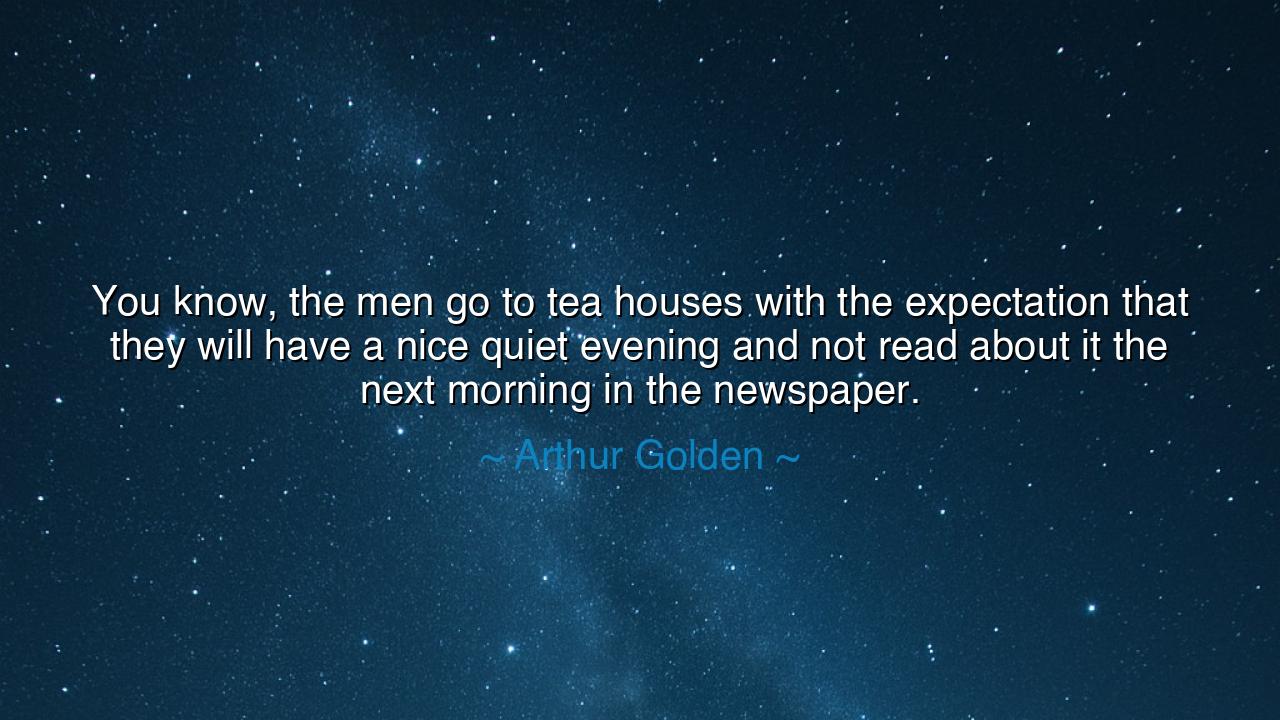
You know, the men go to tea houses with the expectation that
You know, the men go to tea houses with the expectation that they will have a nice quiet evening and not read about it the next morning in the newspaper.






Hear the words of Arthur Golden, author of Memoirs of a Geisha, who captured the hidden rituals of another world: “You know, the men go to tea houses with the expectation that they will have a nice quiet evening and not read about it the next morning in the newspaper.” This utterance, though simple on its surface, carries deep meaning about privacy, trust, and the sanctuary of certain spaces in human society. It is a reminder that not every act of life is meant to be displayed to the crowd; some encounters are sacred precisely because they remain unspoken.
The tea house was not merely a place of drink, but a realm of ceremony, performance, and cultivated grace. Within its walls, the burdens of public life could be shed. Men of politics, commerce, and authority came not only for entertainment, but for a moment of reprieve from scrutiny. They longed to step outside the glare of reputation, to enter a sphere where they could simply be men, without fear that their laughter or folly would echo in the newspaper the following day. Such a place was fragile, built upon trust and discretion.
The ancients too understood the need for such sanctuaries. In Athens, the symposium was a gathering of men to drink, converse, and muse on philosophy or pleasure. What was spoken there was not for the marketplace; it was confined to the circle, sacred in its secrecy. In Rome, the baths served a similar role: places where senators and soldiers could remove their armor, both physical and social, and speak without fear of record. Always, societies have understood that some spheres must remain hidden if the human spirit is to breathe freely.
History bears witness to the destruction that follows when this discretion is broken. Consider the court of Versailles, where gossip spread like wildfire, and every whisper of scandal was carried into the public eye. The nobles, once untouchable, found their weaknesses paraded before the masses. Trust decayed, and soon the monarchy itself collapsed under the weight of exposure. What men once hoped would remain in chambered halls spilled into the newspapers of revolution, and with it, their world dissolved.
Golden’s words, though spoken of tea houses, echo a larger truth: that dignity requires spaces of privacy. The human soul cannot endure a life lived entirely under the gaze of others. To rest, to converse, to be vulnerable, one must sometimes enter a place where no record is kept, where no headline will shout one’s secrets to the crowd. This is not hypocrisy, but necessity, for without such refuge, men and women become actors trapped upon the stage without intermission.
The lesson then is clear: respect the sanctuaries of others. Guard the trust given to you in moments of intimacy, whether with friend, lover, or companion. Do not rush to display what was meant to remain hidden, for in breaking discretion you destroy not only the peace of another, but the very space that allowed truth and vulnerability to emerge. The tea house, in Golden’s telling, is a symbol of that sanctuary—quiet, discreet, and beyond the reach of the newspaper.
Therefore, O traveler, take this wisdom into your life: not all things must be shared, not every story must be told. Hold sacred the confidences of others, and carve out spaces of trust in your own days. For just as the men in Golden’s story longed for their quiet evenings, so too does every soul long for a refuge from the endless clamor of the world. Protect such spaces, honor them, and within them you will find the true strength of human connection.
So remember: there is power not only in speech, but in silence; not only in record, but in secrecy. Let some things remain unwritten, some moments remain untold. For in those unspoken hours lies the quiet dignity of life.






AAdministratorAdministrator
Welcome, honored guests. Please leave a comment, we will respond soon